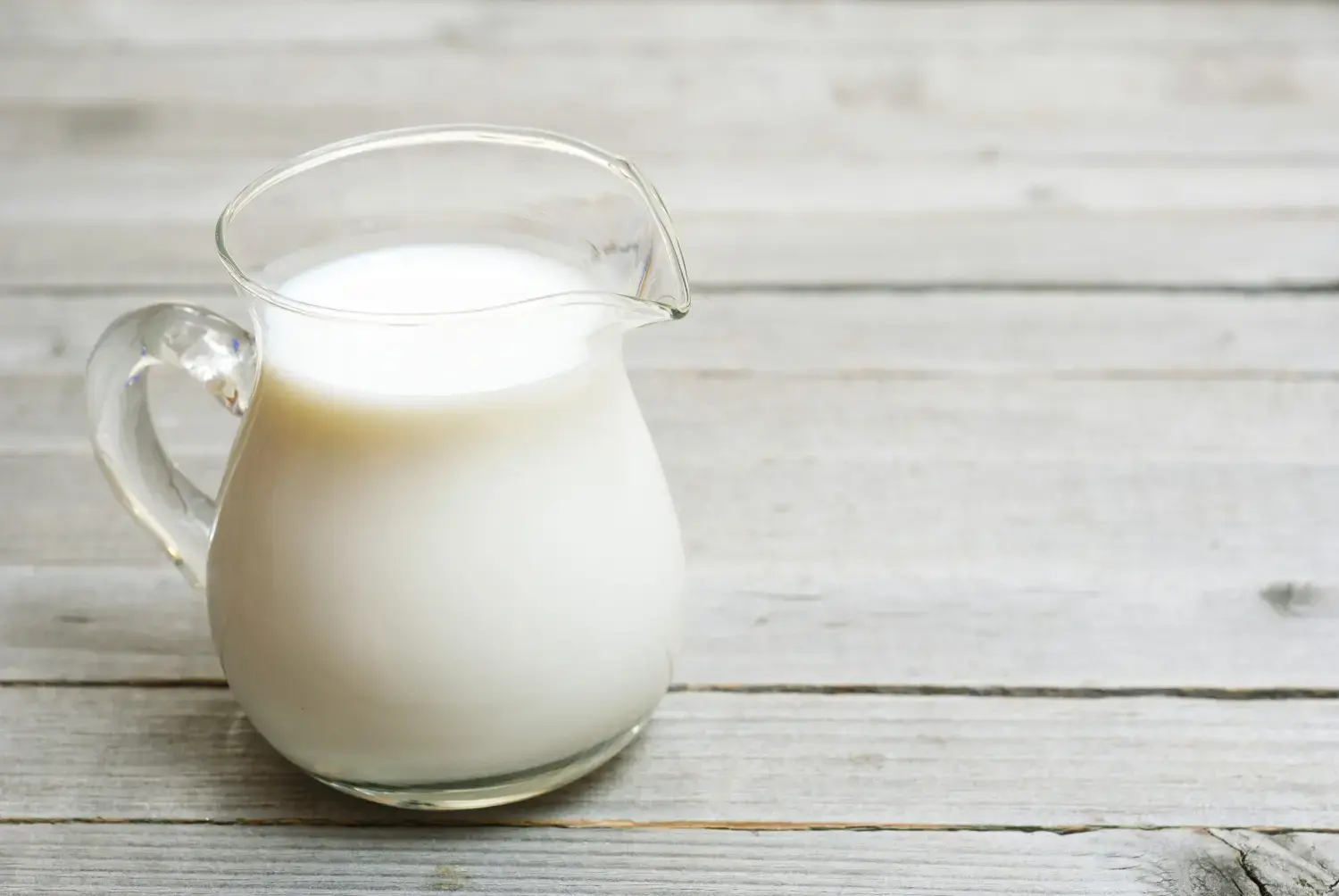
Can dogs drink milk? Sort of. You may be surprised to know that cow’s milk isn’t actually good for dogs, but that doesn’t mean milk is completely off the table. Learn about the benefits of goat's milk for dogs and find out how you can add this tasty treat to your pet's routine.
A tall glass of milk seems like a normal beverage for us, but giving your dog it could lead to a digestive disaster. We’ve all heard the warning that you shouldn’t feed giving your dog (or cat) milk, but why? Are they lactose intolerant?
In this post we will cover the difference between regular cow's milk and goat's milk, the benefits of feeding goat's milk to dogs, and some fun and interesting ways you can incorporate goat's milk into your pet's meals and treats.
Can Dogs Have Milk?
Technically yes, but most adult dogs struggle with lactose and certain milk proteins in cow’s milk. That’s why milk gets a bad rap for dogs. But this doesn't mean that all milk is off the table. Goat's milk is a great and easy to digest alternative for dogs.
-
- Cow’s milk isn’t toxic, but it’s high lactose content makes it harder to digest.
- Pasteurizing kills off digestive enzymes that aid in digesting lactose.
- Cow's milk has high levels of a milk protein that dog's don't digest well.
If you want to offer milk, make sure to choose options that are formulated for dogs. Pet-formulated raw goat’s milk is going to be a safer and more nutritious option than cow’s milk.
Why Goat’s Milk Is Easier on Tummies
Milk from different animals will have different types and levels of proteins, fats and sugars. It's these macronutrients that separates cow's milk from goat's milk.
-
- Lower lactose per serving (and fermented versions include lactase enzyme)
- A2 beta-casein: generally easier to digest than A1 found in much of cow’s milk
- Live probiotics + enzymes (in raw/fermented pet blends) that help maintain a balanced gut microbiome
(We’re talking about products made for pets—frozen raw, fermented, or gently pasteurized. Always follow package handling and feeding directions.)
What's So Bad about Cow’s Milk?
Milk has become a controversial topic because of its digestibility and farming practices. Despite its bad rap, milk is still a staple in many households. How could something as normal for people as milk be bad for dogs?
To understand why cow’s milk is not good for dogs, we have to look at what is done to it to make it safe for us.
There’s a reason we don’t drink milk straight from the cow. Partially because that sounds super gross, but mostly because it could make us sick. Fresh cow’s milk is loaded with gut bacteria that our dainty human bodies may not handle well.
There are also properties in cow's milk that dog's bodies aren't great at digesting. To break it down further, we need to talk about lactose and casein.
Lactose
Our milk is pasteurized. Pasteurization is a way to kill off any harmful bacteria in the milk. This is done by heating the milk to a temperature that the gut bacteria can’t survive. This makes the milk safe for us to drink, but it's also what makes the milk not so good for your dog.
When you cook the milk to pasteurize it, you are killing off good bacteria and enzymes, as well as harmful stuff. This is where the lactose intolerant rumour comes from.
To break down lactose, a naturally occurring milk sugar, dogs need a digestive enzyme called lactase. When the milk is cooked, that enzyme is eliminated, leaving lactose that is very difficult for your dog to digest.
This is one of the reasons that dogs tend to have lactose intolerant-like symptoms if they consume too much of a dairy product. Their bodies can't digest the lactose properly.
Casein
Another macronutrient in milk is protein, called casein. There are two types of casein, A1 and A2 beta-casein. A1 casein is hard to digest and may be linked to allergies and digestive issues, while A2 is considered to be easier to break down and, therefore, better for dogs and cats.
The protein in cow’s milk contains as much as 80% A1 beta-casein, which is another reason why many dogs react poorly to cow’s milk.
Benefits of Goat’s Milk for Dogs
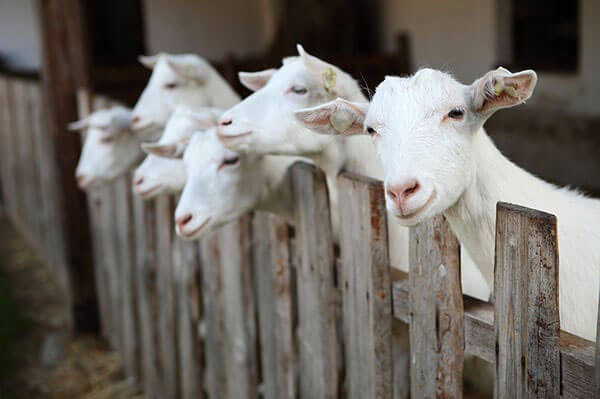
Raw goat milk is a universally tolerated milk for mammals. Any mammal can consume raw goat milk safely, so next time you want to treat your dog to a little milk, reach for goat’s milk instead.
The key here is that the goat’s milk is raw or unpasteurized. Raw goat milk for dogs is more than just a treat, it’s a nutritional aid. The healthy gut bacteria in raw goat milk are excellent for supporting digestion and could help reduce symptoms of allergies and inflammation.
Raw or fermented goat’s milk is loaded with lactase enzymes to make the milk sugars easy to break down and digest. In addition, goat’s milk contains A2 beta-casein, which is much easier to digest and is not linked to the same issues as casein found in cow’s milk.
Not only is goat’s milk safe for dogs, but it’s healthy and highly recommended! The biggest and most desirable benefit of goat’s milk is its digestive properties. Goat’s milk is loaded with probiotics that help to support digestion by increasing the population of healthy bacteria in your dog’s digestive tract.
Goat’s milk also provides:
-
- Moisture - vital to all systems in your dog's body
- Calcium - component of bone, strengthens muscle and supports blood clotting
- B vitamins - support a healthy metabolism, digestion, and hormone regulation
- Vitamin A - maintains eye health and cell function
- Protein - provides amino acids needed to run the whole body
How Much Goat's Milk Should Dogs Have?
All good things in moderation, as they say. Yes, goat’s milk is good for dogs, but too much of a good thing can be bad.
Goat’s milk is a great nutritional supplement, but shouldn’t interfere with their regular, complete, and balanced diet. If you want to supplement daily, try to stick to about 2 oz or less per 20 lbs of body weight.
This amount will give your dog the moisture boost and nutritional benefit but won't overdo the calories and deter them from eating their regular meals.
Best Goat's Milk for Dogs
You don't have to be a goat farmer to have access to fermented or raw goat best milk for dogs. Goat's milk has become a popular and widely available supplement for dogs.
Goat’s milk is most commonly sold in frozen liquid formats, but if you are travelling or if you prefer to make your goat's milk as you need it, then look for a powdered form of goat's milk.
Check out some of our favourite brands:
The Honest Kitchen Goat's Milk
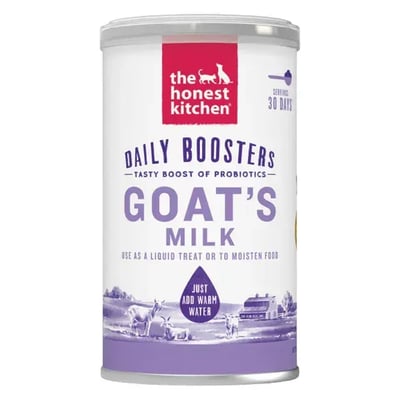
 The Honest Kitchen Goat's Milk is a convenient dehydrated goat’s milk you mix with warm water for an instant, sippable topper. Made for pets, it includes live cultures to support healthy digestion and add hydration. It's great for picky eaters or travel kits.
The Honest Kitchen Goat's Milk is a convenient dehydrated goat’s milk you mix with warm water for an instant, sippable topper. Made for pets, it includes live cultures to support healthy digestion and add hydration. It's great for picky eaters or travel kits.
- Why choose it: shelf-stable powder; mix only what you need
- How to use: serve as a side, pour over kibble, or rehydrate freeze-dried meals
- Good for: moisture boost, gentle tummy support, on-the-go feeding
- Format: powdered (just add water)
Happy Days Raw Goat Milk
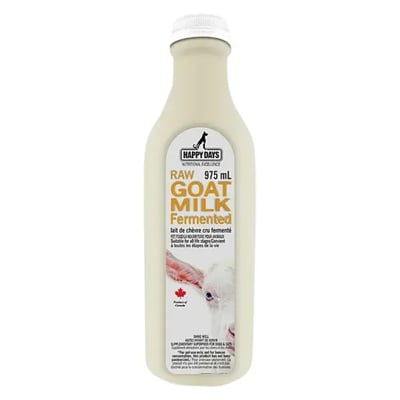
Happy Days Raw Goat Milk is a Canadian-made fermented goat’s milk crafted specifically for pets. Naturally rich in live probiotics and enzymes to help maintain a balanced gut, with a mild flavour most dogs love.
- Why choose it: fermented for live cultures; Canadian sourcing
- How to use: thaw, shake, and serve as a topper or treat; freeze into pupsicles
- Good for: kibble hydration, routine digestive support, hot-day cool-downs
- Format: frozen liquid (store in freezer; use within 7 days after thawing)
Primal Raw Goat's Milk
Primal Raw Goat Milk is an easy to feed meal topper and nutrient booster. This tasty topper supports digestion and hydration, perfect for levelling up everyday meals. Choose from the original recipe or try one of the popular flavoured options like pumpkin or cranberry.
- Why choose it: easy pour, dog-approved taste; some blends add extra whole-food ingredients
- How to use: splash over meals, blend into frozen treats, or warm slightly (not hot) to entice appetite
- Good for: picky eaters, moisture-light diets, simple nutrition upgrades
- Format: frozen liquid (shake well; follow thaw/use-by directions)
5 Tips for Feeding Goat’s Milk for Dogs
It’s commonly fed as a stand-alone side dish, but these creative feeding tips are a great way to make goat’s milk fun and exciting, especially for picky pets who get easily bored with their pet food.
1. As a Meal Topper
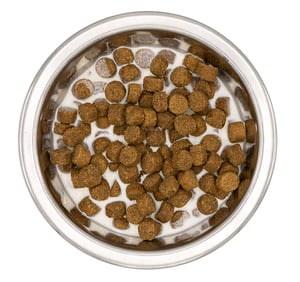
Spruce up any dog diet by dousing it with a little bit of raw goat milk. This delicious dog cereal-style meal format is a great way to add more moisture, flavour, and a digestive boost. Dog kibble diets benefit the most from this moisture boost, but goat's milk can also complement a raw, wet, or dehydrated diet.
2. Rehydrating Freeze-Dried
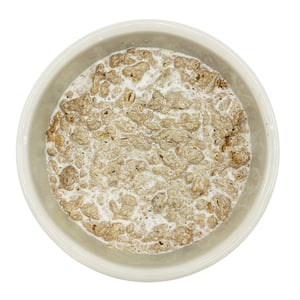
Instead of rehydrating your dog’s freeze-dried dog food with plain old water, use goat’s milk instead. The additional nutrition will bolster the meal. This is a great tip for picky pets who need a little more encouragement to maintain healthy eating habits and those who would benefit from the digestive boost.
3. Frozen Dog Treats
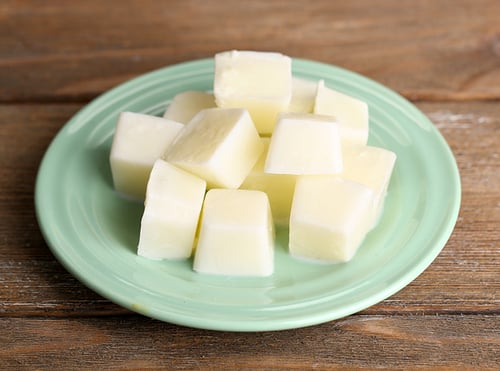
Use goat’s milk in your favourite frozen dog treat recipe. Goat’s milk can replace the more common base in frozen dog treats, yogurt. Mix it with pureed fruit, pumpkin, or bone broth for a tasty and nutritious snack.
If your dog loves stuffed Kongs, then goat’s milk will also be a welcomed addition to that recipe. Mix it with treats, kibble, broth, or canned food before freezing it for a cool, nutritious, and long-lasting snack.
4. Puppuccino w/ Cold Foam
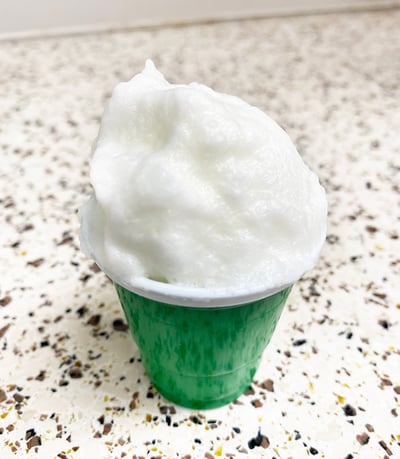
If you’ve ever been through the Starbucks drive-through with your pooch, then you’ve probably treated him to the infamous “secret-menu Puppucino.”
While this treat is tasty and adorable, it uses whipping cream made from cow’s milk, and might not agree with your dog’s tummy. We put together a dog-friendly alternative to this creamy treat using goat’s milk.
Ingredients & Tools
- Raw Goat's Milk
- Milk Frother
Directions
- Pour a 1/2 serving of goat's milk into a shallow bowl that your pet can drink from.
- Pour the other half into a mug or small mixing bowl for frothing.
- Submerge the frother in the milk and froth for 20-30 seconds to create goat's milk cold foam.
- Pour or spoon cold foam over the dish of goat's milk and serve.
This recipe is definitely more work and is not going to be an everyday treat, but is a super cute recipe for special occasions like birthdays and puppy play dates. Customize this recipe by adding a splash of bone broth or pumpkin to give this treat the real look of a doggy latte.
Sprinkle on some finely crumbled dog cookies to get that truly picture-perfect seasonal snack.
5. Other Milk Products for Dogs
While goat's milk is the gold standard, it's not the only option for offering your pet a nutritional and flavourful boost. Kefir made from sheep milk or water buffalo milk are safe for dogs and offer similar benefits to raw goat's milk.
You can also find goat cheeses and frozen yogurt products made with these alternative raw milks. They make great treats or meal toppers, and even better, dog's love them.
Best Goat's Milk for Dogs FAQs
Is goat’s milk good for dogs?
Yes. Goat's milk is packed with essential nutrients, probiotics, and enzymes that can aid in digestion, boost the immune system, and promote overall health in dogs.
Can dogs with lactose intolerance have goat’s milk??
Goat's milk is often tolerated better by dogs with lactose intolerance or dairy allergies because it contains lower levels of lactose and different proteins compared to cow's milk.
How do I add goat’s milk to my dog’s diet?
Goat's milk can be offered as a standalone treat, poured over kibble, or used as an ingredient in homemade dog treats or as a base for mixing with other dog-safe foods.
Is goat’s milk OK for puppies or seniors?
Goat's milk can be especially beneficial for puppies due to its easy digestibility and immune-boosting properties. For senior dogs, it can aid in nutrient absorption and support joint health.
Can goat’s milk help with an upset stomach?
Yes, goat's milk is known for its ability to help with upset stomachs and diarrhea in dogs. Its probiotics and enzymes can restore gut balance.
Can Dogs Have Cow's Milk?
Some dogs can tolerate it, but it's generally not recommended. Goat's milk is a much better alternative to support digestive health.
.png?width=200&height=66&name=logo%20(1).png)


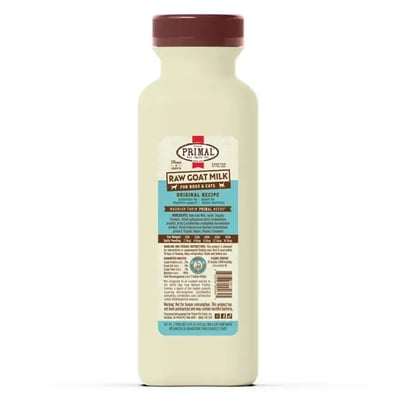

.jpg)
